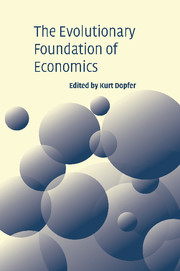Book contents
- Frontmatter
- Contents
- List of contributors
- List of figures
- List of tables
- Prolegomenon
- I Ontological foundations
- II A framework for evolutionary analysis
- 8 Towards an evolutionary theory of production
- 9 Learning in evolutionary environments
- 10 The evolutionary perspective on organizational change and the theory of the firm
- 11 The self-organizational perspective on economic evolution: a unifying paradigm
- 12 Evolutionary concepts in relation to evolutionary economics
- 13 Understanding social and economic systems as evolutionary complex systems
- 14 Perspectives on technological evolution
- 15 Evolutionary economic dynamics: persistent cycles, disruptive technology and the trade-off between stability and complexity
- 16 Evolutionary theorizing on economic growth
- Index of topics
- Index of names
- References
8 - Towards an evolutionary theory of production
Published online by Cambridge University Press: 22 September 2009
- Frontmatter
- Contents
- List of contributors
- List of figures
- List of tables
- Prolegomenon
- I Ontological foundations
- II A framework for evolutionary analysis
- 8 Towards an evolutionary theory of production
- 9 Learning in evolutionary environments
- 10 The evolutionary perspective on organizational change and the theory of the firm
- 11 The self-organizational perspective on economic evolution: a unifying paradigm
- 12 Evolutionary concepts in relation to evolutionary economics
- 13 Understanding social and economic systems as evolutionary complex systems
- 14 Perspectives on technological evolution
- 15 Evolutionary economic dynamics: persistent cycles, disruptive technology and the trade-off between stability and complexity
- 16 Evolutionary theorizing on economic growth
- Index of topics
- Index of names
- References
Summary
Introduction
Since the time of Adam Smith, Francois Quesnay and David Ricardo economists have sought to ground their theoretical analyses of economic organization in an appreciation of the nature of real production activity. Any such effort must balance two competing concerns. On the one hand, the obviously fundamental role of productive activity in economic life seems to demand a highly accurate appraisal, presumably based on detailed scrutiny. On the other hand, the objectives of economic science often seem best served by a broad-brush characterization carried out from a considerable distance. These scientific objectives are, after all, quite different from those of engineering or operations management.
In mainstream neoclassical theory, the second of these considerations clearly seems dominant. Production theory as it has developed in that tradition is strong on abstract generality and treats production in a way that is convenient for the neoclassical analyst. In that tradition, production theory is partly for answering questions about production and its place in economic organization, but it is at least equally concerned with sealing off questions that are not considered fruitful for economists. It places a boundary marker that serves to identify the limits of the specifically economic concern with production, beyond which lie areas of concern to engineers, managers and technologists.
It should be obvious that evolutionary economics needs to strike quite a different balance. Evolutionary thinking sees questions of production as tightly and reciprocally connected with questions of coordination, organization and incentives.
- Type
- Chapter
- Information
- The Evolutionary Foundations of Economics , pp. 221 - 254Publisher: Cambridge University PressPrint publication year: 2005
References
- 9
- Cited by



